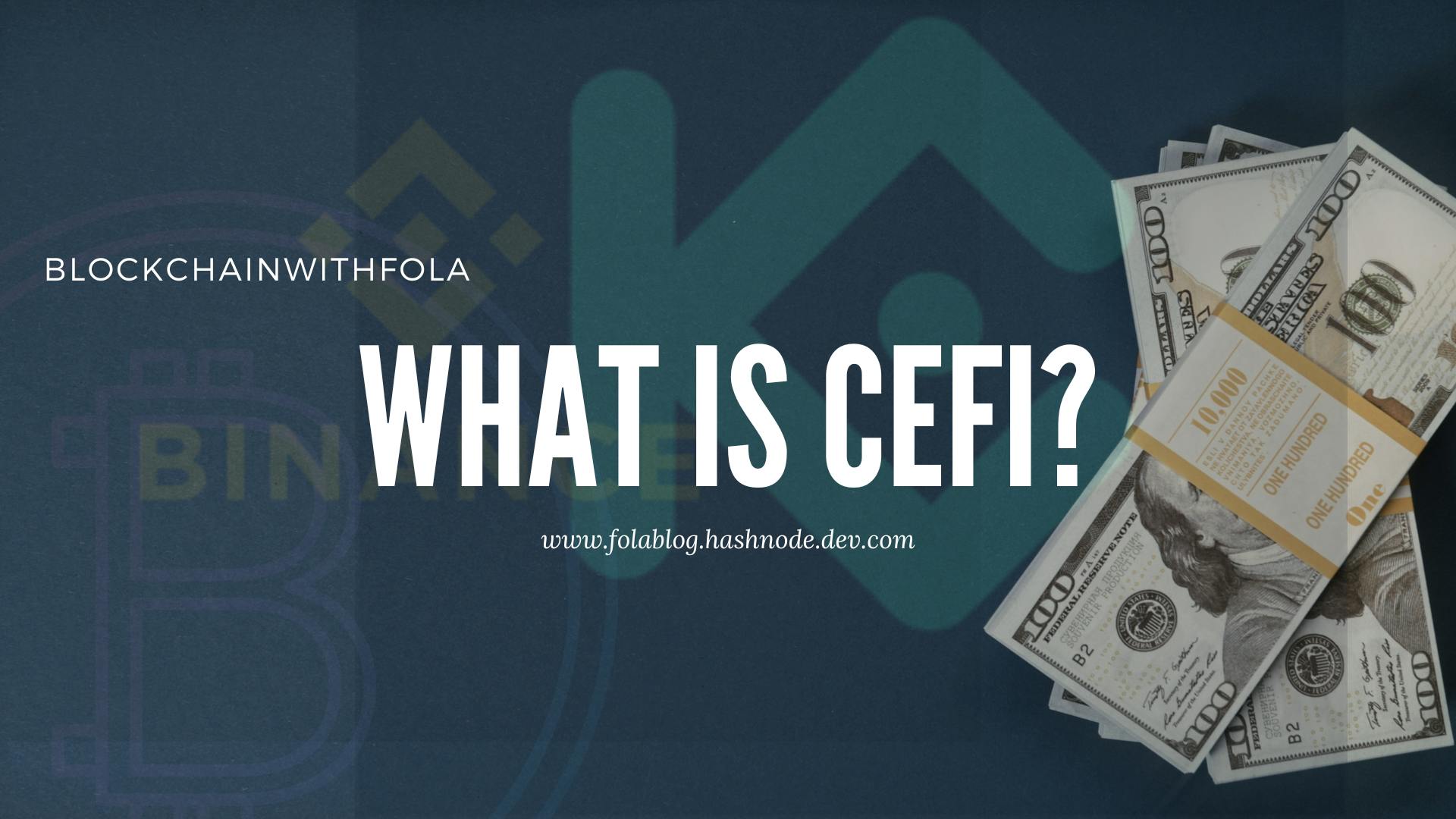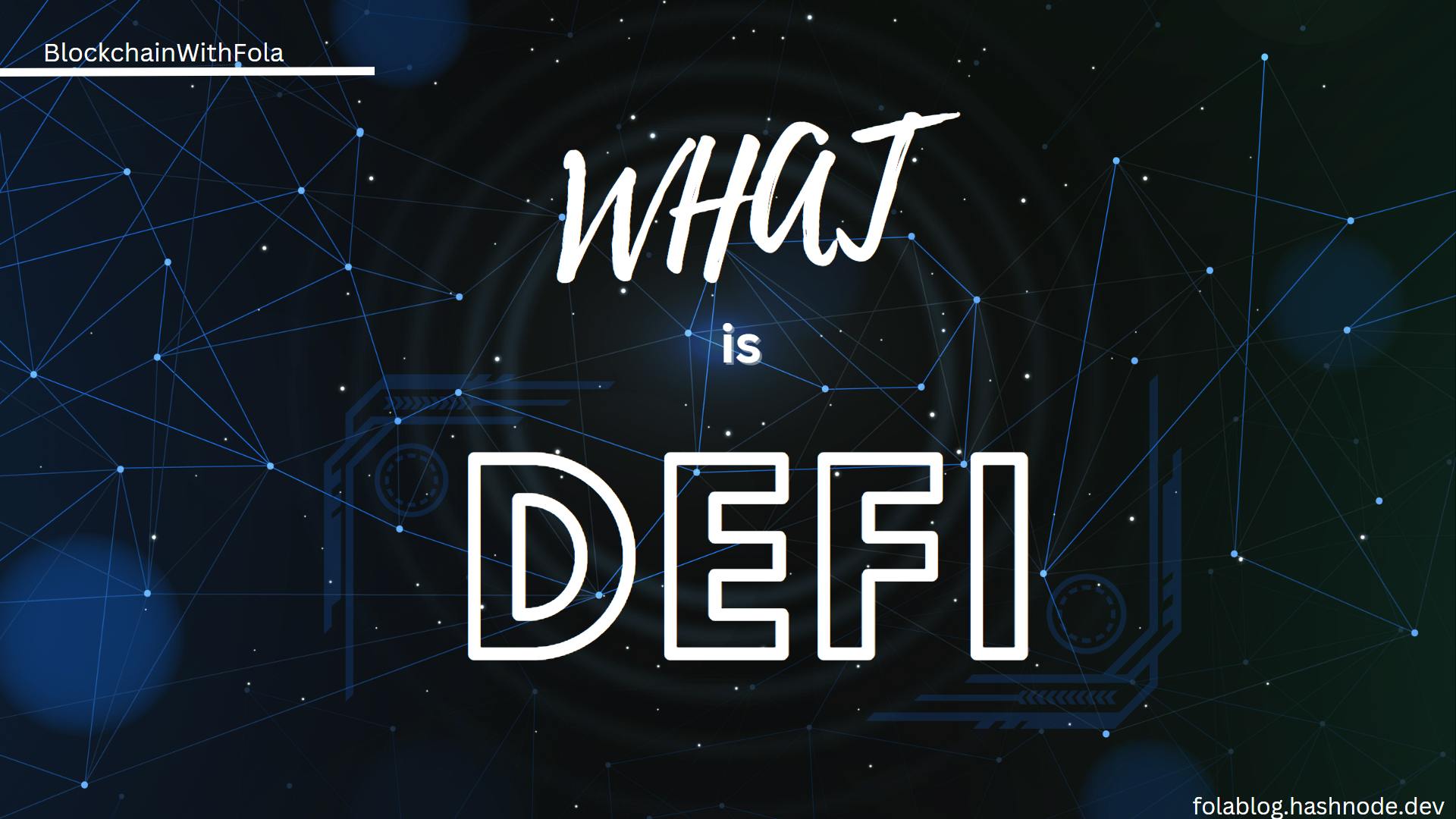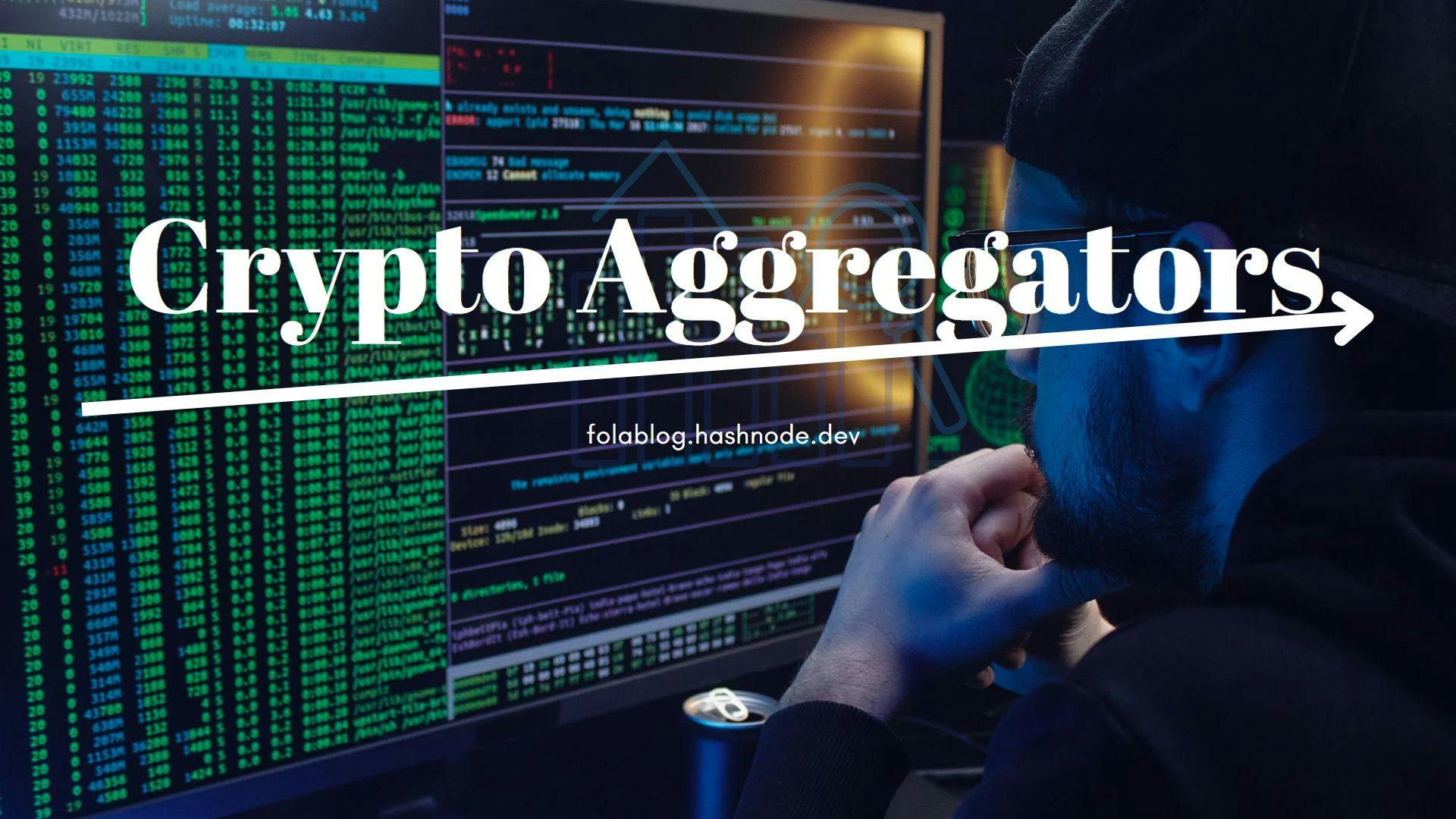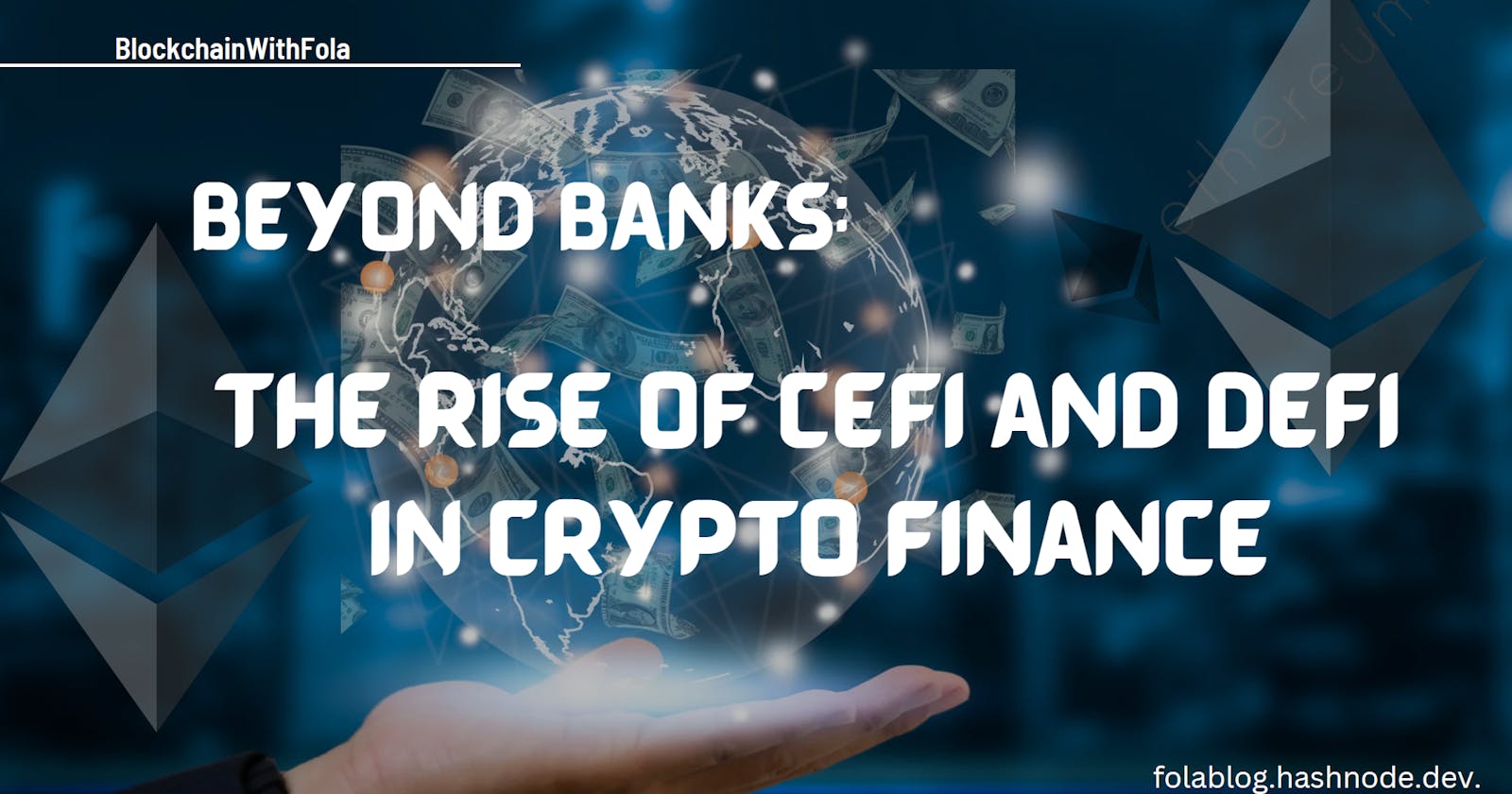Introduction
Traditional financial services such as payments, lending and borrowing were only available via established financial institutes and banks. But it transformed with the introduction of blockchain technology. In this article, we will be discussing CENTRALIZED FINANCE and DECENTRALIZED FINANCE.
The rise of CeFi and DeFi is posing a challenge to the traditional banking system, which has long dominated finance. People are starting to reconsider the need for traditional banking institutions and financial intermediaries as they become more aware of these new approaches.
This is because CeFi and DeFi provide a more transparent, secure, and easy way to access financial services.
By end of this article, you'll have a better understanding of what CeFi and DeFi are, their differences, their impact and how they are transforming the world of finance. Moving on, we need to have a better understanding of these two concepts.

What is CeFi ?
Before DeFi was introduced, Centralized Finance was the standard for trading cryptos. It handles a stronghold over the cryptocurrency industry. CeFi is short for Centralized Finance, which means financial transactions and services that are controlled or regulated by central authorities.
Most financial transactions in traditional finance are governed by a centralized authority, such as a bank or a financial institution. This means that the transactions are processed and controlled by a single entity, which can cause issues with transparency, security, and accessibility.
In the crypto world, we refer to them as Centralized Exchanges or Protocols. They somehow operate like traditional banks, they are regulated to some extent, meaning you are not fully in control or have full ownership of your capital. Examples of CeFi, Binance, Kucoin, ByBit and many more.
Benefits of using CeFi compared to Decentralized Finance.
Centralized finance has quite a few benefits worth making the headlines. CeFi tends to offer a more holistic approach and focus on maximizing the value of cryptocurrencies. In general, CeFi platforms are more flexible and convenient compared to DeFi; you can do fiat-to-crypto conversions and cross-chain exchange. You’ll also get higher interest rates when depositing assets on CeFi platforms. Furthermore, users have access to customer service provided by individuals or companies managing the funds in case of issues or troubles with the services. Some benefits could include;
User experience
Interacting with centralized institutions will be more similar to what users are used to. Transactions occur faster, and the interfaces can be far simpler, requiring less technical expertise.
Liquidity
At the time of writing, CeFi offers more trading and exchange options than DeFi. Centralized exchanges have far more liquidity as they control which cryptocurrencies become listed on exchanges. These are generally in demand, cryptocurrencies or crypto assets with some use cases making them sellable.
Customer support
DeFi operates using smart contracts on top of a blockchain. In the event of a negative occurrence like theft or a cyberattack, users can’t report to a supervisory or regulatory body. CEXs in CeFi, on the other hand, operate like regular banks, offering round-the-clock customer care. CEXs are responsible for your cryptocurrency, necessitating their assistance should something go wrong.
Cross-chain exchanges
With CEXs, converting cryptos on one blockchain to those on another is more straightforward because individuals many times don’t own the crypto, with transactions represented in a SQL database. Some cross-chain DEXs exist such as Thorchain.
Affiliate Marketing
Affiliate marketing programs are frequently provided by centralized exchanges, and they can be a wonderful method for users to make money by promoting the exchange to their network of friends, followers, and subscribers. Users have the opportunity to profit from each trade that their referrals make.
Fiat-to-crypto conversions
With so many exchanges and trading volumes, CeFi offers the most extensive fiat-to-crypto conversions for cryptocurrencies. These facilities help crypto's growth by enabling individual and institutional investors to inject significant amounts of capital into the market, providing ample liquidity for prominent like (BTC) and ether (ETH).
Diverse Trading Options
CEXs make availability of a broader range of trading alternatives than DeFi platforms, such as spot trading, margin trading, futures trading, and numerous trading pairs.
5 Top Centerlized exchanges
KuCoin
ByBit

What is Defi
DeFi is short for Decentralized Finance.
First, what is Decentralization?, It's a process by which the activities of an organization and different individuals are distributed or delegated away from central, authority or regulated bodies.
Decentralization in finance, on the other hand, means that financial transactions that operate via automated applications that are developed on top of blockchain platforms with no central authority.DeFi is an open-source, permission and transparent financial service ecosystem. DeFi also refers to the network of financials built on blockchain.
Decentralized networks employ blockchain technology, which allows for more transparent and secure financial transactions. In DeFi you have full control over your assets and own the key pair for your wallet(non-custodian wallet). Defi also gives you full control over your funds, the original purpose for the existence of the blockchain and crypto is Decentralized finance. In DeFi you are your bank, there is no CEO, and everyone is accountable for the security of their funds. To participate in DeFi you need to use decentralized applications (dApps) built on the blockchain platforms. examples, Ethereum blockchain( Uniswap) and Binance Blockchain (Pancakeswap) these dApps operate on applications like Trust Wallet, Metamask and many others.
Benefits of using DeFi compared to Centralized finance.
Faster speed
A lack of intermediaries and borders, combined with the superior speed of blockchain technology results in faster transactions and overall easier access to the services.
Improved transparency
Another fundamental advantage of some of the blockchain solutions is clear transparency between all parties involved.
Programmability
The flexibility of smart contracts can result in superior automated solutions, which in turn can be used to create new assets and financial tools. Highly programmable smart contracts automate execution and enable the creation of new financial instruments and digital assets.
Interoperability
Another result of the system’s flexibility means that it is easier to make protocols and dApps to integrate and complement each other at a deeper level than that possible in the world of traditional finance solutions and services.
Immutability
A decentralized system based on cryptography and data protection using blockchain technology is pretty much immutable, which increases security and trust.
More control
Since DeFi is permissionless, transparent and decentralized, a single user has more control over their finances. There are various solutions to monitor their DeFi portfolio and DeFi statistics. Furthermore, we can say DeFi is permissionless cause it allows you to engage with DeFi without having to ask for permission to send a remittance, get a loan, or send an online payment.
DeFi allows for anonymous or pseudonymous online financial transactions. For proponents, having online financial privacy is a key human right. As an alternative to fiat and legacy payment networks, DeFi allows individuals to be in full control of their finances. Oftentimes, DeFi protocols allow for faster and cheaper payments (and better lending and borrowing rates). While a standard remittance can take days, a crypto payment typically takes from mere seconds to just a few minutes.
Trustlessness
Meaning you don’t need to trust an individual or financial entity to safeguard your finances. This is made possible via the blockchain. To start, verified crypto transactions are immutable (irreversible and unchangeable) so merchants don’t have to worry about a customer reversing or suspending a payment. More importantly, DeFi protocols allow you to fully control your assets so there is no need to trust an intermediary, third party, or financial custodian. With DeFi, “If you have your keys, you have your coins.” This means that you maintain full control of your crypto funds—nobody else can touch them.
To reiterate some of the pros above, DeFi typically allows for financial transactions and agreements that are faster, cheaper, permissionless, trustless, more private (anonymous/pseudonymous), and censorship-resistant.
Three types of decentralized applications run in the decentralized finance ecosystem and are built on blockchain technology.
DeFi (Decentralized Finance) dApps
DEX (Decentralized Exchange) apps
Decentralized wallets.
Next, we will be looking at their meaning, differences and use cases in DeFi.
Understanding the Difference between DeFi dApps and DEX Apps."
DeFi dApps and DEX apps operate in the decentralized finance ecosystem fully built on blockchain. The main difference between them is the type of service they provide.
DeFi dApps offer a range of financial services, while DEX apps specifically focus on peer-to-peer trading. Furthermore, DEX apps concentrate on decentralized exchanges for cryptocurrencies and other digital assets, DeFi dApps offer a wide range of financial services like lending, borrowing, and trading. Both types of apps operate on decentralized networks like Ethereum and employ smart contracts to automate transactions.
4 Top DeFi DappsYou Should Know
4 Top DeFi Dex AppsYou Should Know
Decentralized Wallets
Decentralized wallets are not technically DeFi dApps or DEX apps, they are an important part of the DeFi ecosystem as they enable users to interact with these applications and manage their decentralized finances in a secure and user-friendly way.
4 Decentralized Wallets You Should Know

Rounding up this article, here are 5 crypto aggregators you should know. Well before then,
What is Crypto Aggregator?
A platform or service known as a "crypto aggregator", collects information from various cryptocurrency exchanges, trading platforms, and other sources to give users a complete overview of the cryptocurrency market. Crypto aggregators typically display real-time prices and trading volumes for various cryptocurrencies together with other pertinent data including market research, news, and portfolio management tools.
For traders and investors who wish to compare prices and liquidity across many exchanges and keep track of their cryptocurrency holdings across various wallets and platforms, cryptocurrency aggregators can be very helpful. CoinMarketCap, CryptoCompare, and CoinGecko are just a few examples of well-known cryptocurrency aggregators.
5 Cryptocurrency Aggregators You Should Know
References
Binance Academy
Coindesk
blockchain Council
Coinbase
